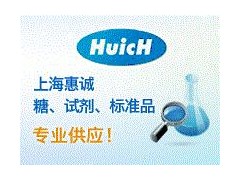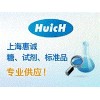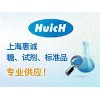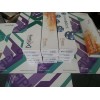规格:5MG
规格:50MG
起订:1瓶
供应:100瓶
发货:3天内
Vitamin E: Tocopherols & Tocotrienols
生育酚
Contents:
d-α-tocopherol, 98.5+% [CAS 59-02-9] 1 vial x 250 mg
d-β-tocopherol, 98.5+% [CAS 148-03-8] 1 vial x 250 mg
d-γ-tocopherol, 98.5+% [CAS 54-28-4] 1 vial x 250 mg
d-δ-tocopherol, 98.5+% [CAS 119-13-1] 1 vial x 250 mg
2,2,5,7,8-Pentamethyl-6-hydroxychroman (PMC), 99.0+% [CAS 950-99-2] 1 vial x 250 mg
Note: PMC is used as the internal standard for HPLC analysis of tocopherol, but not for GC analysis.
Storage condition:
Each vial is aluminum-packed with an oxygen adsorbent. One opening the vials, store the reagent under inert gas in a refrigerator in the dark. Under such conditions, the reagents are stable for 6 months.
Instruction for use (Preparation of each solution)
Weigh 50 ~ 100 mg of each reagent by chemical balance, to the nearest 0.1mg.
Add ethanol or hexane to dissolve the reagent to the final concentration of 1 mg vitamin homologue/mL as the stock solution. The stock solution in tightly capped vials are stable at 5 degrees C for a month.
The standard solutions for each homologue can be prepared by dilution the stock solution just before use.
1072 rac-α-Tocopherol 50 mg 95+% TLC/98+% GC
1071 rac-β-Tocopherol 50 mg 95+% TLC/98+% GC
1073 rac-γ-Tocopherol 50 mg 95+% TLC/98+% GC
1790 δ-Tocopherol 50 mg 95+% TLC/98+% GC
1074 rac-5,7-Dimethyltocol 50 mg 95+% TLC/98+% GC
1797 Tocol 50 mg 95+% TLC/98+% GC
α β γ δ - 三烯生育酚 标准品
Research use only. Do not administer it to human.
2109 α-Tocotrienol 25 mg 98+% TLC/98+% GC
2110 β-Tocotrienol 25 mg 98+% TLC/98+% GC
2111 γ- Tocotrienol 25 mg 98+% TLC/98+% GC
2112 δ-Tocotrienol 25 mg 98+% TLC/98+% GC
References:
1. Ahn, K., et al. (2007) J Biol Chem. 282:809-820
2. Kannappan, R., et al. (2010) J Biol Chem. 285:33520
3. Tan, B., (2005) The Journal of the American Neutricutical Association 8(1):35
4. Kannappan, R., et al. (2012) Genes Nutr. 7:43-52
5. Mangialasche, F., et al. (2012) Neurobiol. Aging 33(10):2282-2290
6. Patel, V., et al. (2011) Indian J Exp Biol. 49(10):732-738
7. Vasanthi, HR., et al. (2011) Curr Pharm Des. 17(21):2170-2175
Vitamin E consists of four tocopherols and four tocotrienols that demonstrate important and far reaching biological activities. These essential lipids contain a common chromanol ring and either a saturated (tocopherol) or unsaturated (tocotrienol) side chain. The eight common vitamin E isoforms (α-, β-, γ-, and δ-tocopherols and α-, β-, γ-, and δ-tocotrienols) are differentiated based on the number and position of methyl groups on the chromanol ring and the presence of a saturated or unsaturated side chain (figure 1 (pg. 2)). The vitamin E vitamers are commonly found in vegetables, fruits, seeds, nuts, grains and oils, wher they exist in various ratios with each other. The unsaturated side chain in tocotrienols gives them physical properties different from tocopherols, such as an increased ability to cross the cell membrane bilayer (1). Vitamin E has become well known for its role as an antioxidant, in lowering cholesterol and other lipids, as a neuroprotective and anti-cancer agent, and in cardiovascular disease protection. Most vitamin E supplements contain (and many studies use) only α-tocopherol; however, several of the above biological effects are mostly or exclusively found in the other vitamers, making it critical for them to be included in future research. Indeed, the tocotrienols in general may have greater physiological functions than tocopherols (2) and may even be inhibited by an unbalanced excess of α-tocopherol supplements (3).
Scientists at the MD Anderson Cancer Center wrote an excellent article entitled “Tocotrienols fight cancer by targeting multiple cell signaling pathways” (4). Here it is suggested that since tumor cells result from dysregulation of multiple genes a drug is needed that will also target multiple genes. Tocotrienols affect numerous pathways linked with tumorigenesis and thus have potential in both the prevention and treatment of cancer as an active and mild anti-cancer drug.
A recent report from the Karolinska Institute in Sweden described the neuroprotective activity of tocopherols and tocotrienols (5). It is indicated that low plasma tocopherol and tocotrienol levels are associated with an increased incidence of mild cognitive impairment and Alzheimer’s disease. Another report indicates that α-tocotrienol is the most potent neuroprotective form of vitamin E, inhibiting 12-LOX, c-Src, and PLA2, up-regulating MRP1, and inducing arteriogenesis through induction of TIMP1 and decreased activation of MMP2 (6).
Another beneficial function of tocopherols and tocotrienols is their role in preventing cardiovascular disease. The tocotrienols particularly have gained eminence recently due to an increased understanding of their antioxidant effects. Cardioprotective effects of tocotrienols include antagonizing the oxidation of low density lipoproteins, anti-atherosclerotic properties, inhibiting platelet aggregation and monocytes adhesion, and preventing smooth muscle proliferation (7).
Since its discovery, vitamin E has been shown to be a versatile and potent component of biological systems. α-Tocopherol has received much praise over the years due to its remarkable functions; now the less prevalent tocopherols and tocotrienols are starting to gain recognition as indispensable components of the vitamin E family. As Kannappan et al. point out more than 25,000 studies have been conducted on tocopherol while very few studies have considered the role of tocotrienols (4).
But this is sure to change as more scientists become aware that “The multitargeted role of tocotrienols in most degenerative diseases proves it to be an ideal candidate as a nutraceutical/pharmaceutical agent for useful exploitation” (7). Matreya is pleased to introduce the full line of highly purified Tocopherols and Tocotrienols along with Tocols as internal standard markers. We have the capability to produce these compounds in multigram sizes to accommodate your research.
母育酚
dl-Tocol 250mg / 4562元
97+ %
用途:生体内等のビタミンEの定量に使用される内標準物質「トコール」です 30306921
其它维生素 系列产品 Vitamin
| 水溶性维生素 | ||
| 烟酸 | Nicotinic acid | C 15521000/250mg |
| 盐酸吡哆醛(B6) | Pyridoxal hydrochloride | / |
| 二盐酸吡哆胺(B6) | Pyridoxamine dihydrchloride | / |
| 抗坏血酸钠 | Sodium ascorbate | C 10303900/250mg |
| 盐酸硫胺(B1) | Vitamin B1 hydrochloride | C 17455000/250mg |
| 硝酸硫胺(B1) | Vitamin B1 mononitrate | C 17455500/250mg |
| 核黄素(B2) | Vitamin B2 | C 16813600/250mg |
| 烟酰胺(B3/B5) | Nicotinamide | C 15519500/250mg |
| 泛酸钙(B3/B5) | Calcium pantothenate | CA15845000/250mg |
| 泛酸钠 | D-Pantothenic acid sodium salt | C 15845100/250mg |
| 吡哆素(B6) | Vitamin B6 | / |
| 盐酸吡哆素(B6) | Vitamin B6 hydrochloride | C 16652000/250mg |
| 氰钴胺素(B12) | Vitamin B12 | CA11798500/50mg |
| 对氨苯甲酸Bx | Vitamin Bx | C 10171400/100mg |
| 抗坏血酸(C) | Vitamin C | C 10303000/250mg |
| 抗坏血酸钙(C) | Calcium ascorbate | C 10303100/250mg |
| 异抗坏血酸 | D(-)-Isoascorbic acid | C 14379000/250mg |
| 生物素(H) | Vitamin H | C 10625000/250mg |
| 叶酸 | Folic acid | C 13888000/250mg |
| 脂溶性维生素 | ||
| 视黄醇 | Retinol | R7632-100mg |
| 维生素A酸 | Tretinoin | C 17608000/250mg |
| 维生素A乙酸酯 | Retinol acetate | CA17923820/150mg |
| 维生素A棕榈酸酯 | Retinol palmitate | CA17923840/150mg |
| 胆钙化甾醇(D3) | Cholecalciferol | CA17924000/150mg |
| DL-a-生育酚(E) | DL-a-Tocopherol | CA17924300/500mg |
| DL-a-生育酚乙酯 | DL-a-Tocopherylacetate | CA17924320/500mg |
| 维生素K1 | Phytonadione | C 17924400/250mg |
| 甲萘醌(K3) | Menadione | C 14863000/250mg |
| b-胡萝卜素 | b-Carotene | CA11045800/250mg |
| 虾青素 | Astaxanthin | CA10307000/250mg |
| 角黄素 | Canthaxanthin | CA10947000/150mg |
| 硫辛酸 | DL-6,8-Thioctic acid | / |
| 麦角钙化甾醇(D2) | Ergocalciferol | CA17923900/150mg |
| a-琥珀酸(E) | a-Tocopheryl acid succinate | / |
| 叶黄素 | Lutein | CA14652000/50mg |





